外研版必修四模块2思维导图式听写
外研 高中英语必修4Module 2Grammar(共19张PPT)
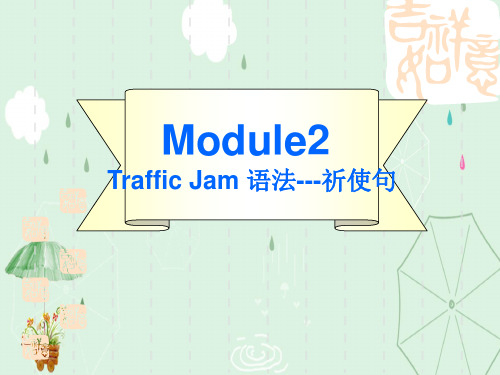
√A. Finding out C. Find out
注意:
B. Found out D. To find out
掌握祈使动词与非谓语动词的功能区别:祈使动词
构成祈使句,表示要求做某事或不做某事;而非谓语
动词位于句首时主要用作状语(表示时间、原因、条
件、目的等),或承接上下文作主语或宾语。
2. 考查带主语的祈使句
B. shall you
C. have you
D. had you
有had better 的句子构成反意疑问句, 用 had 构成。
12. Don’t forget to phone me, ______?
A. do you
B. needn’t you
C. won’t you
D. will you
Module2
Traffic Jam 语法---祈使句
Turn right . Don’t go faster Don’t turn left . than 40 kph.
Don’t stop.
Don’t walk.
祈使句
表示命令,请求,建议,劝告或号召的句子叫做祈 使句。祈使句的主语为 第二人称you , 通常省 略,谓语动词使用原形, 句末用感叹号或句号。
祈使句表示要求,or后的句子表示相反行为引起的结果。 有时为了加强语气, or 也可以换成or else/otherwise. 在 这两种结构中的前半部分都可以用if引导的条件状语从句 替换.
二、在特定语境中考查对祈使句的识别
1. 考查祈使动词与非谓语动词的功能区别 —What should I do with this passage? —______ the main idea of each paragraph.
外研 高中英语必修4Module2reading (共22张PPT)
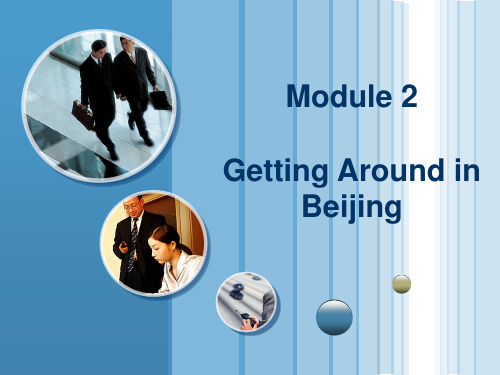
the Forbidde北n海C公it园y 紫t禁he城White
Pagoda
BirdWNaetsetr Cube
Task 1: How to travel around in Beijing?
the underground (B.E) the subway (A.E)
alleys of Beijing.
Task 5 : Make a dialogue
Make a dialogue in pairs (B helps A choose the best means of transport)
A: Mary B: You (a native citizen) Destination: Forbidden City/the White PagodaFra bibliotekhours
ges
24 hours
easy to get expensive
Buses
Minibuses
Underground Pedicabs
5:00ammidnight
5:00am11:00pm
cheap always get a seat
fast convenient
crowded
only 12 passengers terrible in rush hours
Tourists.
Brainstorming
How to travel around in a city?
means of transport
bus trolleybus minibus
train plane
bicycle tricycle
underground taxi / cab
外研 高中英语必修4Module 2Grammar(共24张PPT)
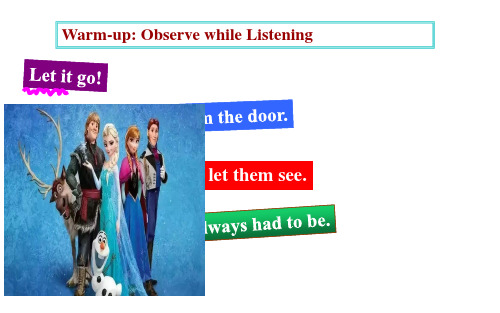
对话感知 A: Don't smoke in the room, will you? B: Ah, I'm sorry, I won't. A: Come to have dinner with us this evening,
will you/won't you? B:Yes, my pleasure. A: Let's take a walk after supper, shall we? B. A good idea, I'd like to. A: Let us go swimming, Mum, will you? C: Of course, go ahead!
四、祈使句+and/or (otherwise)+陈述句
and表顺承关系,意为“那么”; or (otherwise)表转折关系意为“否则”。
Useyour head, and you will find a way.
=If you use your head, you will find a way. 动动脑筋,你将会找到方法。
2. _C_a_l_l _m_e__to_m__o_r_r_o_w_ (明天打给我) and I’ll let you know the lab result.
3. _H__u_r_ry__u_p__o_r_e_ls_e_ (快点,否则)you'll be late.
A Serious traffic jam
Don’ts □Leave the motor on. □Blow your horn. □React when others drive badly. □Break the rules of the road. □Get angry.
新教材第二单元政治必修四 认识社会与价值选择思维导图分享

认识社会与价值选择探索认识的奥秘人的认识从何而来认识与实践认识是主体对客体的能动反映。
实践是人们改造客观世界的物质性活动。
实践具有客观物质性。
实践具有主观能动性。
实践具有社会历史性。
实践是认识的基础实践是认识的来源。
实践是认识发展的动力。
实践是检验认识的真理性的唯一标准。
实践是认识的目的。
在实践中追求和发展真理真理是客观的人的认识都是对客观对象的反映,其中与客观对象相符合的认识就是真理,不符合的认识则是谬误。
真理是具体的有条件的真理都是有条件的。
真理都是具体的。
真理的条件性和具体性表明,真理和谬误往往是相伴而行的。
追求真理是一个过程认识具有反复性。
认识具有无限性。
认识运动的反复性和无限性,并不表明认识是一种圆圈式的循环运动。
寻觅社会的真谛社会历史的本质社会生活在本质上是实践的劳动是社会历史的起点。
全部社会生活在本质上是实践的,也就是把社会生活“当做实践去理解”。
社会存在与社会意思全部社会生活领域由社会存在与社会意识两部分构成。
社会存在是指社会的物质生活过程,主要指物质资料的生产方式,还包括地理环境、人口等社会生活的物质方面。
唯物史观揭示了纷繁复杂的社会历史现象背后的动因,它指出:不是人们的社会意识决定人们的社会存在,相反,是人们的社会存在决定人们的社会意识。
社会意识具有相对独立性。
社会历史的发展社会历史发展的规律物质生活资料的生产活动是人类社会存在和发展的基础。
生产力与生产关系的有机结合和统一构成社会的生产方式。
生产力是生产方式中最革命、最活跃的因素。
生产力与生产关系的相互作用及其矛盾运动,表明了生产力与生产关系之间内在的、本质的、必然的联系,这就是生产关系一定要适合生产力状况的规律。
经济基础是指由社会一定发展阶段的生产力决定的占统治地位的生产关系的总和。
经济基础与上层建筑的相互作用及其矛盾运动,体现了两者之间的内在的、本质的、必然的联系,这就是上层建筑一定要适合经济基础状况的规律。
生产力与生产关系的矛盾、经济基础与上层建筑的矛盾,是贯穿人类社会始终的基本矛盾。
外研 高中英语必修4Module2Reading (共32张PPT)
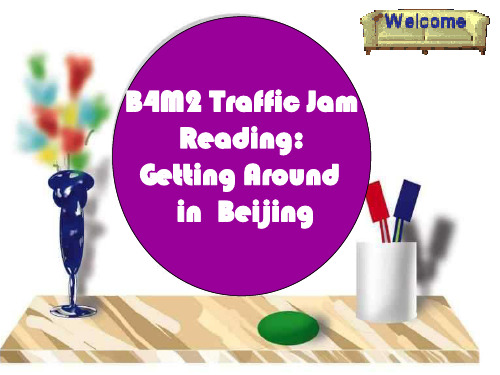
Read para.1 and answer the questions
1.How easy is it to find a taxi?
Simply raise your hand, and a taxi appears in no time.
2.What color are most taxis in Beijing?
Read para.5 and choose the best answer
1.Tourists like these human-pedalled _______ but they can be _________.
A. minibuses; expensive B. underground ; cheap C. pedicabs; expensive D. taxis; cheap
seat
passengers
5:00am11:00pm
fast convenient
terrible in rush hours
convenient for the narrow alleys expensive
Retelling
Retell the passage with the help of the key words. 1) There are many ways to get around in Beijing. 2) First, you may choose ______ .They are convenient but ______. 3) Public transport such as ________ and ________ provides ________ ________ ________ to get around in Beijing but they can get very ________. It’s ________ ________ ________ to avoid public transport during _____ ________ ________. 4) ________ offer an ________ ________ to expensive taxis and crowded public transport. You can always ________ ________ ________even in ________ ________. 5) There are also ________ trains in Beijing. They are ________, _______and ________, but are also ______ during the rushing hours. 6) Tourists, especially foreigners, like ________, that is, humanpedaled tricycle taxis. They are useful for exploring ________ ________ ________(hutong) of old Beijing, but also can be________.
外研 高中英语必修4Module 2Grammar(共29张PPT)
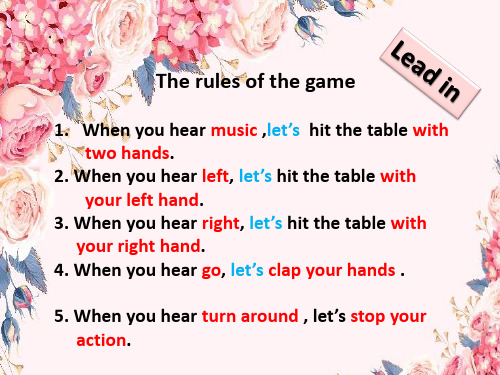
What you have known
imperative
definition
feelings moods
structures
A press B to press C pressing D pressed
3013 湖南4 every day _A__ a proverb aloud several times
until you have it memorized. A read B reading C to read D reads
A bring B brings C to bring D bringing
4. The disjunctive question of imperative sentence 祈使句的反义疑问句
1. Please open the door,_w_i_ll_y_o_u_/_w_o_n_’t_y_o_u__?
Properly in our writing?
e-mail/ letter Inform time/ place
make a wish
make a suggestion/ call on sb. to do
conclusion
Home work:
to make a dialogue with different imperative sentences to show a real situation in our daily life (group performance)
No shouting in buses. Let’s not shout in buses. Don’t shout / make noises in buses. Please be quiet!
